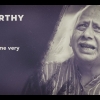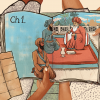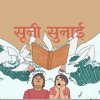I will begin with something more evident than communal morality—with Krishnadevaraya’s Empire, as the empire was about to disintegrate. He had these warlords—nayakas, all over South India. In fact, the reason why Krishnadevaraya favoured Telugu is not because he loved Telugu as his own language, but because it was politically expedient to talk in Telugu. All the warlords distributed over different areas were Telugu people. In Madurai and Tanjore, these nayakas became important and independent on their own when Krishnadevaraya’s empire disintegrated. That is one thing, but that is historical. There is something more important that happened at that time. Both in Madurai and Tanjore, the kings—the nayakas that went there, they acquired kingship in addition to that. They said the king was God, so there was an assimilation of king and God at that time. This is something you do not have throughout Krishnadevaraya’s empire. The beginnings of it I showed you in the last lecture, for example, where Tenali Rama ridicules Krishnadevaraya for accepting the praise that he was Krishna. However, that is not during the time of Krishnadevaraya, it happened later but it was recorded orally in folklore as Tenali Rama saying it.
When a king is assimilated to God, something very interesting happens. When the king was king, a Kshatriya, and a Brahmana was there, both of them made each other. Brahmanas made Kshatriyas, and Kshatriyas made Brahmanas. Krishnadevaraya was not a Brahmana himself but he gave himself the status of being a Brahmana. Every king was not a high caste non-Brahmin king, there is no born Kshatriya anywhere in India, and these Kshatriyas now elevated the status of Kshatriyas by Brahmanas. So each one made the other.
When the king said—I am God myself, what happened to Brahmins? They were demoted, the Brahmin is no more important for the empire. He gets relegated to a relatively unimportant position and the most he can do is serve God. There is something other than that happening at the same time.
If the king is God, who would be the most important people in his court? Who will be closer to the king? Women, of course! He is God, women serve God better than anybody, and therefore women became important. If you really observe it, in Tanjore and later Madurai too, important people, court poets were women. For the first time in South India, or probably anywhere in India, you have women as court poets. That is a very important difference I am making here.
King becomes God, as a result, there is an important thing that began in Krishnadevaraya’s time. As Keshavan Veluthat said, the resources of the kingdom were largely in cash, particularly in Tanjore. What did it mean? When you get money, income is largely in cash—something very important happens. Earlier you were important in society because you were born in a particular caste, that is not important now. I am important because I have money; I make money. It is a very important sociological change that took place. If you have Brahmin, Kshatriya, Vaishya, Shudra, that conceptual organisation of society has completely been destroyed. Whoever has money becomes important. Brahmins are not more important, Kshatriyas and Vaishyas become assimilated, because it is the kings that are important—the nayaka kings were Balijas and most of them were traders, they sold things and made money. So Balijas become kings, which means the Vaishya becomes a Kshatriya, and once the difference between Vaishya and Kshatriya is erased, we have a real problem in the conceptual thinking of society. If a person becomes important because he has money and, secondly, because of this assimilation of Kshatriyas and Vaishyas, major dislocation happens in the conceptual thinking of society, and the poets have to deal with it. That is why, in this time, mythological things that were already available in the past were rewritten. Let me explain to you what that means.
Violation themes—there are several. Chandra falls in love with the teacher’s wife, and a child is born— do you know that before this was mythology, but now the same theme is revisited and with a lot of gusto, a lot of joy. Hey! It is wonderful, they fell in love, it is wonderful! They describe the love affair between Tara and Chandra elaborately—detailed. And in the end, of course, Tara is pregnant, the gods come saying—Sure, sure, it is okay, but let her pregnancy be completed, let the boy be born, then he can go back. So the end is very comfortable, nobody is punished. So, here, the Tara-Shashanka story, which was earlier told with a lot of censure, now Tara is praised and Chandra is praised with an elaborate description of their love affair, including how they made sex to each other. These were the poems that were written during this time.
One more—there is Ahalya and Indra. Ahalya, as you know, Indra coveted her, and Gautama was her husband. Ahalya says to Indra: Hey, has the cock crowed? Indra takes it as a sign and waits, and when he himself becomes a cock and crows, Gautama wakes up and goes to the river to take a bath. At that time, Indra comes, makes love to Ahalya. Gautama, unfortunately, comes sooner than he is expected and they were caught in the act, and you know the results. This story is retold in a number of ways in mythology, you can write about six articles on this. How was this story taken in this period? Because the theme was violation and they were revisiting and rewriting violation themes, so Ahalya Sankranthanamu elaborately describes how Ahalya wanted Indra and could not get him, and Gautama doesn’t pay attention to her and a whole lot of those things. A bhikshuni comes to their home and hesitatingly Ahalya tells her: You know what? I want Indra but I should not say that, it is very dangerous to say that. The bhikshuni hearing that says: What! What is dangerous in that, you are married and you have only one man in your life? What is wrong with you? And you have not already tried to get Indra? That is nonsense. Does Indra know that you are waiting for him to come? No, he does not, so I’m going to tell him! So the bhikshuni, as a matter of fact, tells her all kinds of things, what is good about being a woman. Enjoying sex! If you do not have that, you are not being a woman. So if you are a woman, here is what you should do. You have only one man in your life who does not pay attention to you? What is wrong with you! That is the kind of advice the bhikshuni gives to Ahalya.
In fact, in Tara-Shashanka, there is one point I forgot to mention. When Chandra was hesitating thinking: Oh! It is unfair to sleep with my teacher’s wife. Tara says: What! Impotent men who would not be able to satisfy their wives, to make sure that other men do not touch their wives, wrote in palm leaves that it is wrong to make love to another man’s wife. Please don’t pay attention to those stupid things, they are only palm leaves! They are not Shastra texts, why are you worried about those unnecessary palm leaves? Come! Make love to me.
That is the kind of statements given to you in these texts. These texts—really appreciated by a lot of people. The South Indian school of Telugu poetry, which was considered a highly mature period of Telugu poetry—something happens.
A little after this period, because cash is important, who is important when cash is available? Courtesans. They have a very high status in society, being a courtesan is not only respectable it is respected. Courtesans were poets, singers; they come out in public; they make money; and they handle their own lives. As a matter of fact, you can make a diagram and say housewives and courtesans are the exact opposites of each other. The housewife should be very quiet and should not think of other men; courtesan should always think of other men! A wife, she should try not to have another man, and if she is pregnant by her husband, she should expect a son to be born. Whereas a courtesan wants a girl to be born. A housewife never touches money; courtesan makes money and lives on it, she lives her own life, she doesn’t need anybody to manage her life, and so on. Thus courtesans and housewives are exact opposites of each other. Courtesans are the only people who can come out in public and sing and dance and write poetry, they are scholars and good poets and good dancers. There were many of them, we really do not know exactly how courtesan culture flourished at that time, not enough information is available. I have a feeling that courtesans were not a caste. I believe anybody who wanted to become a courtesan could become a courtesan. They were recruited into courtesan life, not born into it. This is a very important difference actually. And now, these courtesans have social status and social presence, and they get all kinds of attention from other men.
Now, during this time, there is a courtesan called Muddu Palani. Muddu Palani wrote a very interesting book, and that book got many problems in the twentieth century. It is called Radhika Santvanamu, it means teasing Radhika. Krishna, as we know, is very closely related to Radha. Radha is a little older than Krishna; they are lovers and they have been continuing for a long time. However, Krishna has another girl, his own maternal uncle’s daughter, which is a preferred marriage in South India, it is in the Andhra area. Her name is Ila. Now it is time for Ila to marry Krishna. It is a proper marriage, maternal uncle’s daughter, cross-cousin marriage, perfectly acceptable. And Radha cannot object to it, therefore she prepares Ila to be a good housewife, how to love Krishna well, and teaches her all the arts of love. You have elaborate descriptions of how Radha teaches Ila to be a good housewife, sexually satisfying and attracting her husband. So when the wedding took place and Ila was sent to Krishna’s room and they were unclothing themselves, it was very difficult for Radha to accept it. She was outside. She never wanted Krishna to have any other woman, and right in her house Krishna is enjoying another woman whom she has herself trained. At the end of it, Radha was so perturbed that she sent her pet parrot to Krishna saying: Hey! Tell him what he is doing is wrong, he cannot neglect me. The pet parrot goes there and when she sees Ila and Krishna enjoying themselves very intensely, she could not interrupt them and therefore could not give the message. It goes on and on. In the end the pet parrot finally tells Krishna: Radha is waiting for you, she is pining for you, you have to go take care of her. Krishna then remembers: Oh, there is Radha, I forgot! Then he goes to Radha and tries to appease her in a number of ways. I cannot summarise it, but there is an elaborate way of trying to appease her. After that fails, Krishna falls at the feet of Radha, and Radha kicks him with her left foot and Krishna says: Oh, I am sorry, I hope you have not hurt your foot! Eventually they make up, there is intense lovemaking between Radha and Krishna, and that is how the story ends. Retelling the story does not make any point, it doesn’t say anything about the book. It is a powerful erotic book.
Now when the nineteenth century comes, and the British arrive, and there is a person called Veereshalingam, a social reformer. He was the one who decided that being is a veshya (a courtesan) is a blot on society, we should abolish all the veshyas, no veshya should live. Now, veshya is taken to be a harlot. She is not same veshya as she used to be before—musician, public performer, poet, etc. Now she is simply a whore, she is described as one. Efforts have been made by a number of people, especially the men folk of the veshya families who wanted to prohibit veshya culture and public dancing by veshyas. When the prohibition took place, veshyas lost their jobs, and their importance in society. They were treated as whores and taken to court when they were found doing what they did as a business.
Now it is very interesting for legal scholars to look at, how once a law was implemented by British people, how it has to be twisted to make it acceptable and convenient for people who suffer from that law. Veshyas now say: Hey, no! We are not whores, we are god’s servants, devadasis. That was what was created to tell the court—we are not whores. Now suddenly there were a whole lot devadasis because the court cannot deny that you should not be a devadasi, they could not make it illegal. That is how they did not go to jail. So now, there are devadasis, as an abolished act, and they were trying to convert these devadasis or these whores into housewives. Tried to give them something to do which is respectable and tried to see if they could get married and try to live a normal life of a wife. A wife who is subservient to the husband and all those things. There is a whole story, it is not easy.
Now, when the veshyas become devadasis because they were considered whores, what is the story? At the same time there is a new law prohibiting all sexually open books. So all the books that were produced during the Tanjore period—Ahalya’s story, Tara-Shashanka Vijayamu that I was telling you about, all those stories with violation themes, elaborately describing sexuality, detailed sex—they were all now considered bad books.
There were especially two people who built that, one was Veereshalingam who unfortunately wrote Lives of Poets—I told you in one of my lectures that the idea of writing a life of poet is nonsense. But, he was the one who created a life of a poet with a date of birth, growth and death. In a series of lives of poets, he came to Muddu Palani. He looked at the book and decided it was a very immoral book, this should be proscribed, so he wrote there saying that all the things in this book are not only immoral they should not be spoken by women. There are other immoral books men wrote, but that’s okay. But here is a woman writing those things, a woman cannot use those words, you cannot hear those words from the mouth of a woman! In Telugu, it is a little grammar lesson here. In the first person, men are in one class, non-men are in the other class. Non-men means animals, birds, beasts and women. That is the grammatical distribution in Telugu. In plural, they are human and non-human. In singular, men are in one class and all the other beings are in the other class. So you can use the same pronoun for an animal, a bird or a woman. There was some resistance on the part of the woman, to be used by the same pronoun used for all other animals and birds. So, slowly people developed another pronoun to use for women. Veereshalingam uses that other pronoun called amey for all the women in his Lives of Poets, but when it comes to Muddu Palani, he simply still uses the pronoun adi—it. That was written in his Lives of Poets.
There is a very interesting woman—in fact, Bangalore has something to do with it. She is called Bengalooru Nayaratnamma, a woman born in Bangalore, she lived in Bangalore—a great life and she was a veshya, a courtesan. This woman picked up that book in a very dilapidated shape, bought it, edited it and published it, with a preface denouncing Veereshalingam: Hey Veereshalingam, you have denounced this book, saying veshyas should not say these words, look, I am a veshya, a pativrata, living with one huband, which is a regulation for a married woman. Veshyas are not married women so there is no question of pativrata for a veshya, we can sleep with any man, there is nothing wrong. And I am a veshya myself, and she belongs to my jaati (community).
She picked up that book and raised a number of questions: Why do you call this book an immoral book? Are there not equally immoral books in Telugu written by men poets? You don’t find fault with them? But a woman wrote it and it’s a problem for you? With this devastating preface, she published the book. Veereshalingam was very upset. He had a lot of power in the government, he was working with a lot of people in the government. With some cooperation from them, he worked very hard to get the book prohibited, and the government prohibited the book. Veereshalingam was behind this prohibition order. All the books that were there in bookstores were collected and taken away.
Now there is a big problem. There are people who support Veereshalingam and there are people who take the oral side of the story and denounce Nagaratnamma. This is because Christians came, and from their point of view sex is sin—we are living in sin, born in sin—but that is not the case for Hindus. There is no part of the body that was supposed to be bad or immoral. There are situations where a woman is described with all her body parts, including her pubic hair. Even Goddess Saraswati and Parvati were described with these words. There is a story in Telugu translation where a king was going home very fast. Why? Because that day was the first day of menstruation, and he has to sleep with wife that night, if he is supposed to have a good son born. So, he is rushing home to be in time to sleep with his wife that night. There was this Nandini Dhenu, Kamadhenu’s daughter, but he did not pay attention to her, otherwise he would normally pay respects to her and move on, but that day he did not because he was in a rush to go and sleep with his wife. And Nandini Dhenu cursed him: May the result of what you are expecting not happen.
Why am I telling you this story? When they proscribed the book, they made sure all the erotic parts are removed from it. Even then, there were words—even when describing a goddess, there are references to breasts and pubic hair.
Why all this situation? Because, suddenly, intellectuals of India, beginning from Veereshalingam up to C.R Reddy—a very well-known intellectual and theoretician of literature and he was known to be as important as Artistotle or something like that. He was very important, his book was read by everybody, he was the greatest modern Telugu literary critic, and he had a tremendous power, and he reading all these Telugu prabandhas, he dismissed all of them as unacceptable. How many of them? Quite a few! Syntaxes, jokes you say. A poet who describes the situation when a new bride and a husband go into a bedroom all the relatives leave but the poet does not, he still stays in the room and describes what they were doing. That is the kind of language used, and that is why these books were obscene. So from C.R. Reddy onwards, books which were considered to be very, very good books in Telugu literature, interesting books, were considered bad books. Now you have a whole new definition for the period— Tanjore era, and later on the Madurai era, was producing Telugu literature—it is called ksheena dasha, this is a black period in literature, a rotten period. The real good period comes when the British government comes and starts having good books. In fact, what the British did was to encourage writers like Veereshalingam to write novels and other texts that could be used in a classroom because Telugu texts were not worthy to be in a classroom, they were highly sexual. And therefore we need new books in Telugu for teaching in a classroom, therefore they had Veereshalingam write a novel called Rajashekara Charitra—it’s a horrible novel actually and they gave an award to it and it was used in classes.
So, the British government entered the classrooms, entered Telugu literature, changed all that saying: This is obscene, don’t do this. This is a very interesting move. You know that would not have been much of a problem given the poets and intellectuals were themselves not convinced that writing sex is important. As a result of indoctrination by Christian morality, even though it is usually called Victorian morality, even poets and writers got convinced. At that time when old books were reprinted, any time there was a word related to sex there are dots in the book. I have so many books where pages of books are dot dot dot dot dot, otherwise they would be punished and taken to court.
After freedom, in 1947, Prakasham, who was the chief minister of Andhra, removed that law and therefore we could reprint the books without the dots. In fact, even texts like Kamasutra were considered immoral and therefore not printed. At that time, there is a possibility for printing these books and smuggling them to India. You go to the French territory of South India where the British law does not apply, and therefore the books were printed in the French territory and smuggled in. I have a bunch of books printed there; we had to be very, very careful. These were some of the things going on. Even now, Telugu poets do not use sexual words when describing a woman. But there is somebody else here, his name is Rabindranath Tagore. Tagore, even though he was writing in Bangla, was considered a great poet, was given an award—the Nobel Prize. He is a highly colonised person, completely converted by colonial morality—that is the reason why they developed the Brahmo Samaj, there is no God. If you read his Gitanjali, there is no name for God. You don’t get any kind of eroticism in it, there is no way of describing a woman and God, of course, having any kind of relationship. In fact, what you find in Tagore’s book is not love, is not shrungara, its agaapi—God’s leela. There is no description of a woman in Tagore’s poetry. There is love of the heart, heart-to-heart, they don’t even kiss. I can go on and on, talking about Tagore. Tagore very much had an influence on Andhra. People from Andhra went to Shantiniketan and became students of Tagore. They came back influenced by Tagore, and they wrote poetry talking about a woman, purely in terms of hair and eyes, that’s as far as they go, they stop there. Purely, there is love between a man and a woman as heart-to-heart, there is nothing more than that, no touch of bodies. That kind of poetry became very popular in Telugu, called poetry of feelings. It was reaction to earlier poetry, which was full of body. So it was the result of a number of things—the British importing of Victorian/Christian morality, lyrical poetry of Keats, all those things that were being taught in universities where there is no mention of the body of a woman. Tagore who writes poetry without reference to the body of a woman—Telugu poetry also follows the same things. And of course there is C.R. Reddy who dismissed all the earlier poetry as bad poetry. We have an acceptance in the part of Telugu people and Telugu poets, that writing about sex is immoral.
You can go to any temple; you can’t avoid copulating men and women on walls. You can pick up any old book and you cannot avoid copulation between men and women. Description of copulation is one of the many descriptions a poem should have. That’s what the old Telugu poets did. Now those things cannot be accepted, even though they were in the works of great poets, they would not repeat them, they never wrote like that again. Great Telugu poets do not touch sexuality in the same way they used to before.
Now, there comes prema. Prema is an interesting word. Telugu has two different words, prema and kaama. Kaama is sexual, prema is asexual. I can have love for my daughter, which is prema, or the love of a mother. Love for a wife is kaama. These were very clearly separated in Telugu language. Now for the first time the concept of prema was also applied to sexuality. Also, sexual relations are now called prema. So—I love you, which is recently used by young men and women here, is prema. So—I am lusting after you, using kaama, is no more in the language. Earlier there was a clear differentiation between kaama and prema in Telugu literary as well as popular use. All this is because we got the conclusion that unlike the gods of Christian morality, Hindu gods were obscene, and we need to clean it up. Hindu literature, Hindu temples, and stories of Hindu gods have to be cleaned up. There is no part of Hinduism that goes without being censured by Christian/Victorian morality. The impact is really deep and still continues and does not change.












